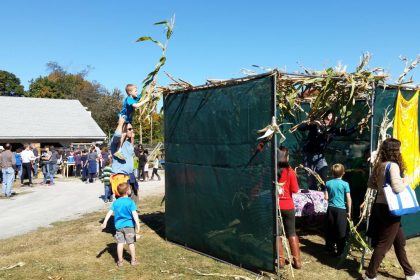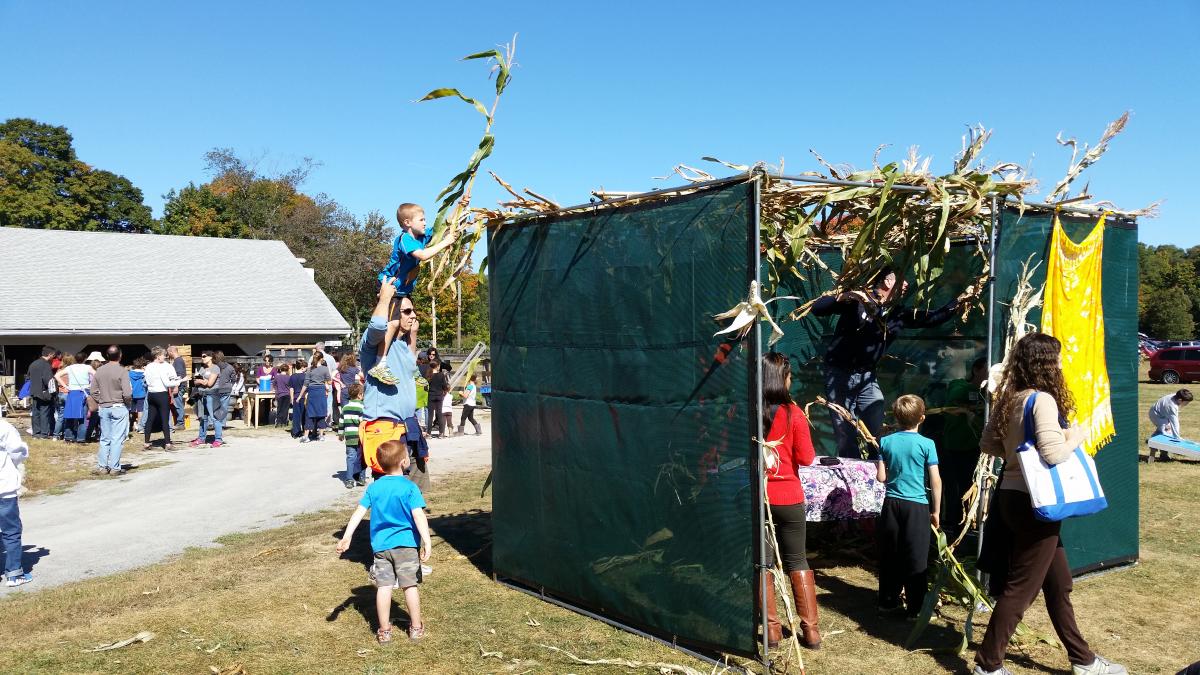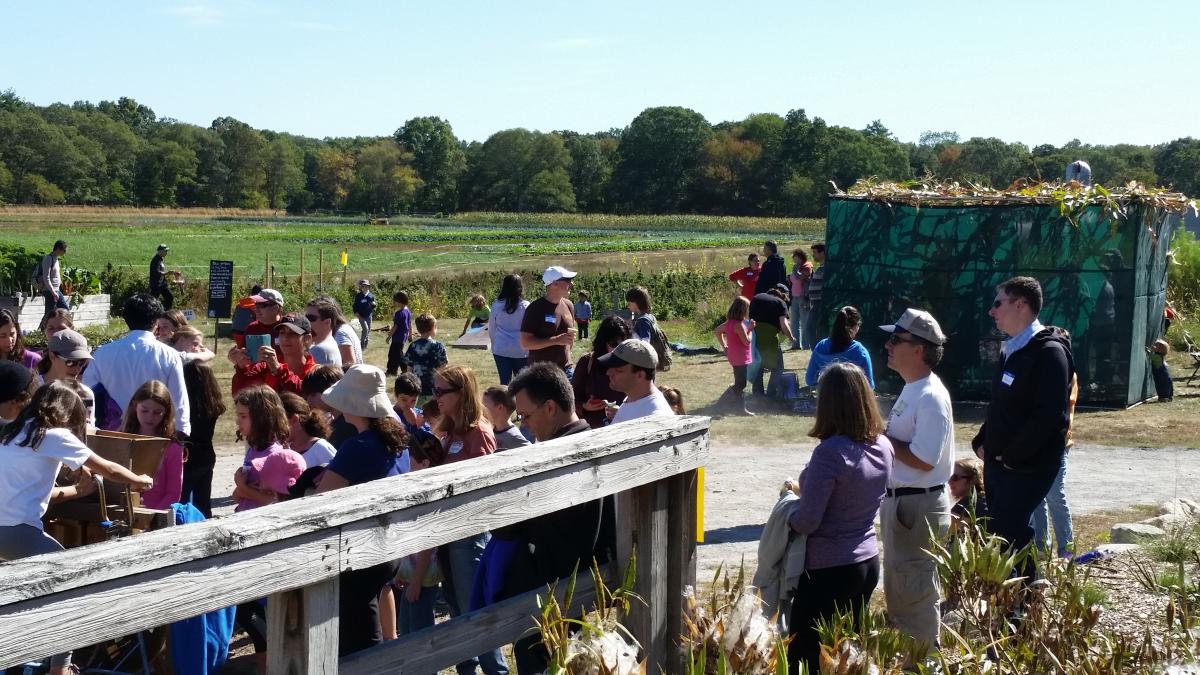
During autumn in New England, Jews celebrate both our local seasonal abundance as well as Sukkot, a biblical holiday with multiple names and historical meanings. Most generally known as a celebration of the harvest and the last of the three pilgrimage festivals (Shalosh Regalim) during the time of the Temple, it was an opportunity to bring offerings and reaffirm commitment to God and community. It is seven days of recognition of hard work, thanksgiving, and mandated celebration. Let’s explore:
Chag HaSukkot, the Festival of Booths:
You shall live in thatched huts for seven days; all natives of Israel shall live in booths (Sukkah) in order that future generations know that I had the Israelites dwell in booths when I brought them out of the land of Egypt. (Leviticus 23:42-43)
 We build a temporary hut-like structure that should have at least two and a half walls, the ability for rain to get in, and for us to see the stars. The sages tell us that we should spend as much time in the temporary Sukkah as possible, and consider it as our home, including eating and sleeping there. As a child in suburban Philadelphia, I was allowed to fall asleep in the Sukkah in our backyard until “the middle of the night” when my parents would bring us inside (you know, once it was dark and we were asleep, like 9 pm).
We build a temporary hut-like structure that should have at least two and a half walls, the ability for rain to get in, and for us to see the stars. The sages tell us that we should spend as much time in the temporary Sukkah as possible, and consider it as our home, including eating and sleeping there. As a child in suburban Philadelphia, I was allowed to fall asleep in the Sukkah in our backyard until “the middle of the night” when my parents would bring us inside (you know, once it was dark and we were asleep, like 9 pm).
Rabbi Adina Allen recently wrote in the Huffington Post, “Living in the fragile, impermanent sukkah invites us to practice releasing illusions of our own power, relinquishing control and fully inhabiting our vulnerability.”
Chag Ha-Asif, the Festival of Ingathering:
Three times a year you shall hold a festival for Me: You shall observe the Feast of Unleavened Bread … and the Feast of the Harvest, of the first fruits of your work, of what you sow in the field; and the Feast of Ingathering at the end of the year, when you gather in the results of your work from the field. (Exodus 23: 14-16)
Many also understand these temporary booths as erected by farmers who lived in the fields during the harvest. Long days, working quickly to get the crops harvested before they rotted in the fields, or the seasonal rains began, they provided opportunity for shade and for rest when there was no time to journey home. Camping out in the fields simultaneously guarded the remaining bounty from thieves. And what better place to celebrate than where it all happens? To harvest and celebrate amidst the fields.
Zeman Simkhateinu, the Season of our Rejoicing:
You shall keep the Feast of Booths for seven days, when you harvest your crops from your granary and winepress. You shall rejoice and feast… [all] who dwell in your community. Seven days you should celebrate… and you shall be altogether joyful. (Deuteronomy 16:13-15)
The Jewish calendar moves us from one of the most solemn days (Yom Kippur) to a week of joyous celebration. Internal accounting amidst communal responsibility allows us to begin the coming year with hope, joy, and appreciation of God’s sheltering presence. When sustenance depends primarily on what can be produced locally, growing takes on added significance and the gathering added joy. Harvesting is indeed a time of celebration – of gratitude for what has brought us to this place, and for what is.
The harvest is the culmination of years and months of hard, intense work, constant monitoring and anxiety as to the status of the crops. Fall in agricultural Israel is the end of the olive, grape, and date harvests. After Sukkot, our daily worship (until Passover in the spring) includes prayers for rain to nourish the soil and soon-to-be-planted new crops. The turn of the agricultural season is marked by celebration and prayer for the winter rains.
All these themes are relevant in a contemporary context, even as most of us are not currently subsistence farmers and making pilgrimage with offerings to the Divine three times a year. The cycle of Jewish holidays accompany in our current seasonal variance. These days, my Sukkot meals are filled with apple dishes, winter squash, leafy greens, and warm sweaters and conversations about where our food comes from. Our local farmers are still harvesting a lot, but not simultaneously weeding and planting with the same intensity as in the summer months. It is a transition to cover crops and a winter period of rest for our land and the farmers.
With increased recognition of how interdependent we are on each other and our natural resources, we can embrace these themes of intense activity, gratitude, and celebration. We celebrate our bounty and appreciate all that we are grateful for.
While we can’t sleep in our Sukkah, you can gather and rejoice in it!
Upcoming events:
Leora Mallach is the Co-Founder and Director of Ganei Beantown: Beantown Jewish Gardens, building community through hands-on sustainable food system education rooted in Jewish text, tradition and culture in the greater Boston area. She can otherwise be found hiking in the White Mountains, experimenting in the kitchen, doing batik artwork, or browsing ethnic stores for new items to try.




